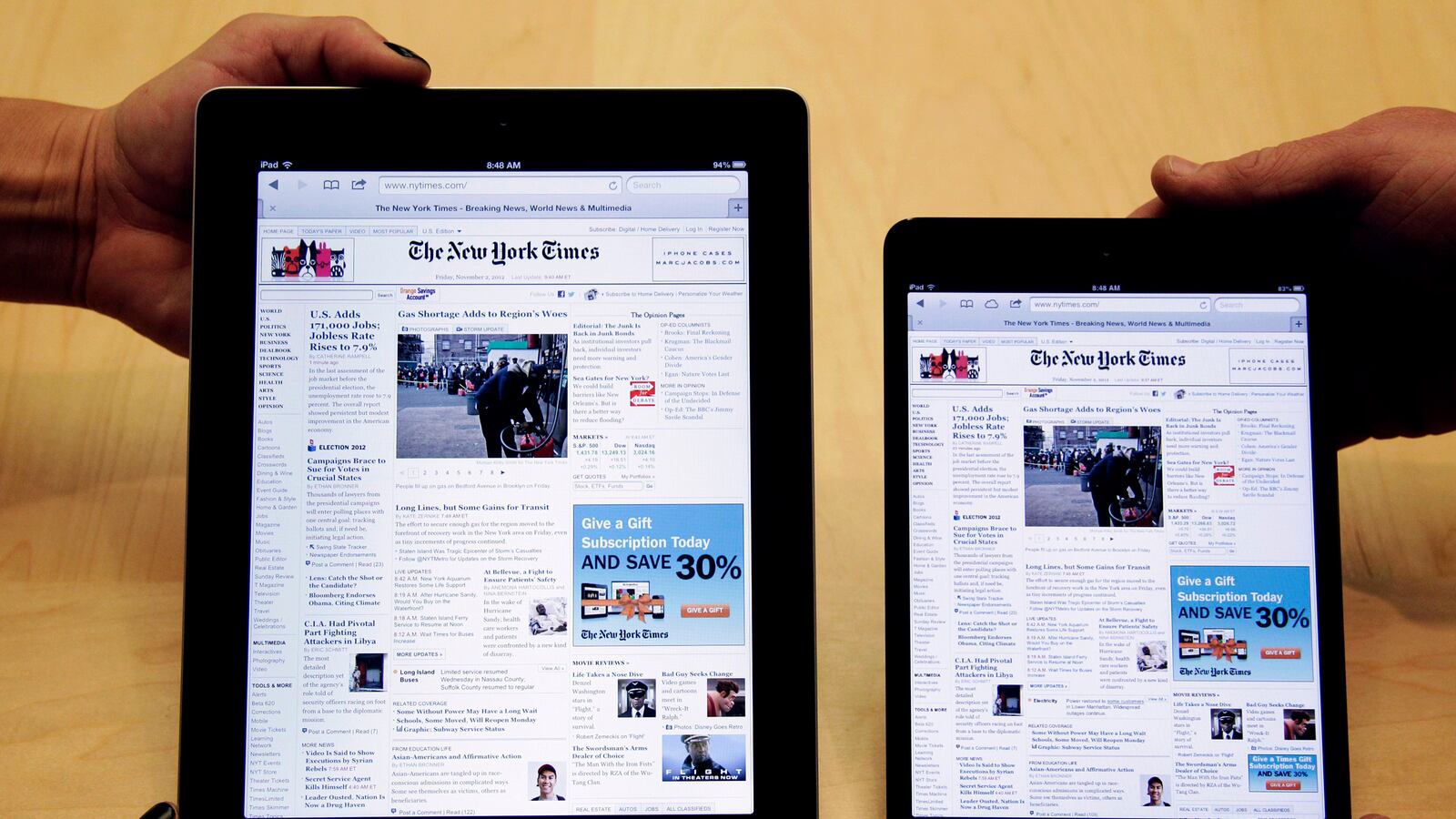A brand new iPad Mini, along with a revamped iPhone 5 and speedier regular iPad apparently haven’t been enough to stop Apple’s stock from a steady decline. Despite the onslaught of new Apple products released in the last few months, the tech giant is in worrisome territory—on Wednesday Apple stock hit a five-month low: 20 percent below the record high it reached in September. Meanwhile, executives are leaving, and competitors are taking a bite out of Apple franchises. Could this be the end of Apple as we know it? Are we witnessing the Apple-pocalypse?
When the iPhone 5 was released on Sept. 21, Apple stock, the most valuable company on the NASDAQ, reached an incredibly high price of $705.07 per share. On Thursday morning it had fallen to $549.38, officially putting the stock in bear market territory (defined as a 20 percent decline in a two-month period). For the last two quarters, Apple has failed to meet Wall Street’s forecasts.
Van Baker, research vice president at tech research firm Gartner, attributes the sudden slip to a “perfect storm” of three recent events: the departure of iOS mastermind Scott Forstall and research chief John Browett at the end of October, concern over supply-chain constraints that are hindering sales, and a lack of completely new, innovative products. Since Steve Jobs died, all recent Apple releases have been iterations or improvements on existing products. This may be worrying consumers who wonder if Apple still has the ability to shock the market with something as revolutionary as the iPhone again, Baker says.
But fears over Apple’s future don’t stem just from what is happening inside Apple. The company is facing stronger and increasingly more aggressive competition than ever. Apple has historically reaped the reward of slow-to-adapt competitors and their skepticism around the viability of its products. When the company first started releasing its revolutionary products, rivals were often years behind. Remember the Blackberry? Or the Zune? “The industry in general has gotten a lot faster paced. Innovations happen on a much more rapid basis,” Baker explains.
While Apple continues to hold an air of superiority over competitors struggling to catch up to iPad and iPhone success, products like Microsoft’s recently released Surface tablet and Android phones are quickly gaining traction in the marketplace and could be humbling to the tech giant. Microsoft, Samsung, Google, and Amazon are all on Apple’s heels. On Monday, KPCB partner Mary Meeker presented research showing Android phone adoption is six times faster than the iPhone. Then, on Thursday, Strategy Analytics, a Boston-based research firm, announced that Samsung’s Galaxy S III overtook Apple’s iPhone 4S as the world’s highest-selling smartphone for the first time in the third quarter. The firm’s director noted this was unlikely to last, but the message to Apple is clear: watch your back.

This sharp decline in Apple’s stock seems strange coming after high sales reports from Apple. Last Monday, Apple announced it had sold 3 million iPads since the Nov. 2 release of the mini and the newly updated iPad. That’s double the company’s previous record of 1.5 million units of the iPad 3 over a three-day period. “We’re working hard to build more quickly to meet the incredible demand,” said CEO Tim Cook in the aftermath. But the release of the iPad Mini marked two foreboding signs for the company. Its recent foray into the seven-inch tablet market was the first time it had ever followed competitors into a market, and not vice versa. And the company was expressly going against the wishes of Steve Jobs, who had eschewed the idea of a smaller tablet. “They basically left the door open ... and Amazon and Google moved in very aggressively,” Baker says.
“[Apple] hasn’t introduced a truly new product since the launch of the iPad nearly three years ago; instead it’s making incremental and overhyped improvements to its current lines,” wrote Dan Crow, an early Apple software engineer, in an article for The Guardian. Crow predicted the company’s turn for the worst in a post-Jobs era. “Though the company will continue to see great success, will create amazing new products and will continue to make bucket loads of money, the pace will slacken, more mistakes will happen and it will not return to the levels of execution and brilliance we saw in the first decade of this millennium,” he wrote.
In the wake of these disappointing numbers and strong competition, is it time for the company to revamp its strategy? Baker doesn’t necessarily think so. “It’s not like they really failed at anything,” he says. “It’s just that there’s been some uncertainty in the market.” Apple is still a wildly successful leader in the field, but in time the world will be expecting something as game changing as the iPod, iPhone, and iPad have been. Said Baker: “They’re going to have to bring something to the market where people will go, ‘Gee, I hadn’t thought of that,’ and they’re going to have to do it well.”





